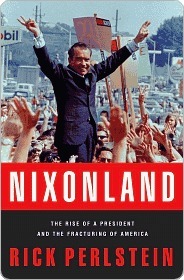More on this book
Community
Kindle Notes & Highlights
Read between
December 8 - December 13, 2024
Another important broadcast that wasn’t a commercial was hosted by Walter Cronkite. Its subject was Watergate.
The candidate was howling, howling into the wilderness.
Henry Kissinger oozed oleaginous sycophancies.
He felt dejected. Soon he would fire his entire cabinet. He needed more control. The landslide, a successful criminal cover-up: it wasn’t half enough.
In this book I have written of the rise of two American identities, two groups of Americans, staring at each other from behind a common divide, each equally convinced of its own righteousness, each equally convinced the other group was defined by its evil.
I have written of the rise, between the years 1965 and 1972, of a nation that had believed itself to be at consensus instead becoming one of incommensurate visions of apocalypse: two loosely defined congeries of Americans, each convinced that should the other triumph, everything decent and true and worth preserving would end.
Richard Nixon died in 1994. At his funeral, Senator Bob Dole prophesied that “the second half of the twentieth century will be known as the age of Nixon.” In a sense he surely did not intend, I think Bob Dole was correct. What Richard Nixon left behind was the very terms of our national self-image: a notion that there are two kinds of Americans. On the one side, that “Silent Majority.” The “nonshouters.” The middle-class, middle American, suburban, exurban, and rural coalition who call themselves, now, “Values voters,” “people of faith,” “patriots,” or even, simply, “Republicans”—and who feel
...more
This highlight has been truncated due to consecutive passage length restrictions.


